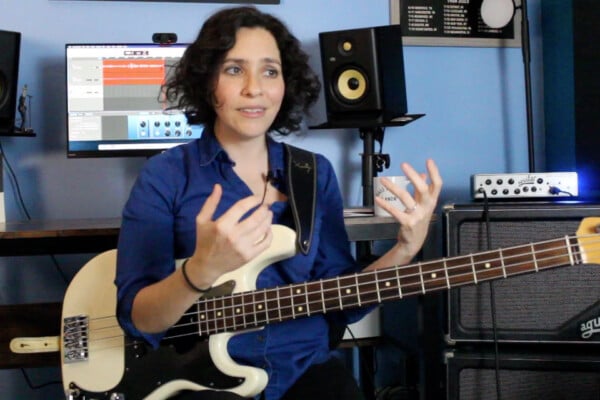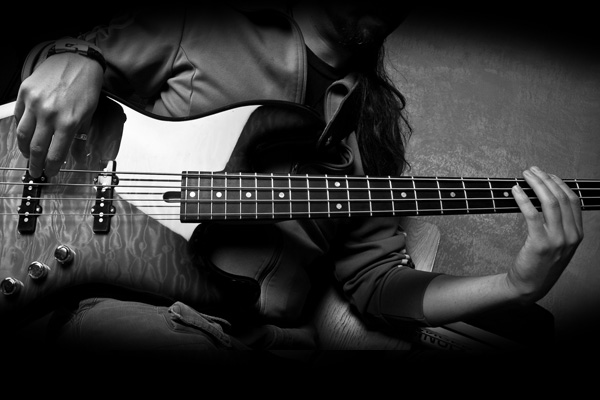The Lightbulb Moment: It Takes One To Know One
How do I play that bass line?
Why do I have to use my pinky?
Can’t we skip all the theory stuff?
These are just some of the questions raised by a student in a recent lesson. Some of these are easy to answer… like the usefulness of the pinky finger (two heads are better than one, four fingers are better than three). Other questions are a bit harder, especially when you have to discuss the value of learning theory.
This particular student is a singer-songwriter turned bass player who decided that after years of playing guitar and recording songs, it was time to develop competence on bass. He hopes to record bass parts on his songs and isn’t shy about trying to direct the lessons toward that. Most of the musical concepts that I attempt to teach are met with the question “why do I need to know that?” followed by a longwinded explanation by yours truly.
Today’s lesson started out like many others, with a review of last week’s assignment and a few technique exercises. I was pleasantly surprised by the fact that the student actually did do his homework… well, most of it. Playing the major scale in different keys? Practiced. Four fret span finger exercise? Practiced. Learning a song by ear? Skipped.
I must admit that this caught me by surprise. Most students tend to do the opposite; they skip the “boring” technique work in favor of jamming and learning songs. I can’t blame them for wanting to work on songs, and in fact, I encourage it. This student, however, failed to see the merit in doing so.
“How is learning other people’s songs going to help me with mine?” questioned the student.
“It takes one to know one,” I replied.
There are thousands, no, millions of songs out there in the universe, but only a handful of different chord progressions common in Western music. Much of the pop, rock, blues, folk and soul music we listen to include just a few simple chords… one, four, five. C-F-G. Some songs are in a minor key, some songs stay on one chord the entire time, and some just go between two chords. The more songs you learn, the more you recognize the chord progressions when they happen, as well as when they’re similar. You begin to develop a consciousness about the chord progressions and develop a vocabulary based on genre, style, and rhythmic approach.
As I saw the student’s eyes glaze over, I suggested that we listened to one of his original songs. He played me a quick demo, I figured out the chords, and played them on his guitar.
“Alright, now I’ll be the guitar player and you be the bass player. Let’s experiment by playing over these chords.”
The song was simple, Em-C-D. The student began fumbling around, playing something resembling a guitar solo more than a bass line, and quickly realized that he was being too busy.
“I don’t know what to do,” he said.
“Well, it turns out that this chord progressions is pretty common. Let’s find a song with the same one and listen to what that bass player does.”
The song had a striking resemblance to “All Along The Watchtower,” so we gave it a listen and tried to figure out the bass line. The student quickly realized that all he had to do was play the same bass line, just in a different place on the neck to match the chords to his song. That seemed to work! I played a few more examples for the student, focusing on different rhythmic patterns and a few simple fills that I admittedly recalled from other songs.
This “takes one to know one” concept isn’t new. It shows up in almost everything that you have to learn. Think about being on a baseball team and discovering how to approach certain plays. What do you do when there’s a man on first? What if there’s a fly ball? When does the short stop cover second base? It’s situational learning… recognize common scenarios, practice different approaches, and then apply it in real-time. It’s an incredibly effective way to learn, and mixed with a bit of creativity, will provide you with a vast library to pull from when you approach new songs.
Ryan Madora is a professional bass player, author, and educator living in Nashville, TN. In addition to touring and session work, she teaches private lessons and masterclasses to students of all levels. Visit her website to learn more!




Ryan, what a timely column! I have found that as my ear developed, lead in part by your column “Bass Players to Know”, I’ve finally start *listen* with a different intent. I’m barely across the threshold on this but I finally have a lightbulb that I’ve named vocabulary. Keep these coming !!
Another great article, Ryan. Puts a lot of stuff into perspective for students and teachers alike
Excellent advice and reminds i have not approached this is quite a while, thanks !
Hey Ryan… Right on! Another good lesson for any musician to you?Well done??